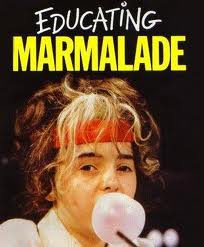Category: Nostalgia
“It always seems impossible until it’s done.”
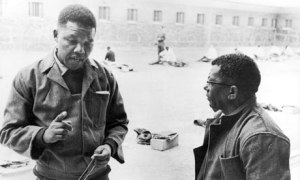 How to begin? Over the past day or so, across the globe, across all sections of all kinds of societies, the voice of individual after individual has paid testimony to the profound significance of Nelson Mandela’s life, and death. Crowds have gathered to sing and dance and celebrate, emulating in their actions the idea of solidarity and shared humanity that his life came to symbolise. I wonder if there is any more I can add to the general outpouring of goodwill of a scale and breadth that it is impossible to imagine any other political figure inspiring.
How to begin? Over the past day or so, across the globe, across all sections of all kinds of societies, the voice of individual after individual has paid testimony to the profound significance of Nelson Mandela’s life, and death. Crowds have gathered to sing and dance and celebrate, emulating in their actions the idea of solidarity and shared humanity that his life came to symbolise. I wonder if there is any more I can add to the general outpouring of goodwill of a scale and breadth that it is impossible to imagine any other political figure inspiring.
The death of Margaret Thatcher earlier this year prompted an immediate blogpost on my part. With no time to think it came out as an emotive stream of consciousness – it was easier to write. This time, life and work has forced a delayed response, and that delay seems to demand a thoughtful, considered approach that I don’t quite know how to achieve. Conjuring Thatcher, of course, is not just about her also having died this year, and it is not just about her also having been a towering political figure of our historical moment, and it’s not just about her having dismissed the ANC as a terrorist organisation and having opposed sanctions as a crime against free trade. And it’s not just that the absence of human empathy, which places those Thatcherite ideals of personal wealth accumulation and economic liberalism above all else, is in such stark contrast to the quite extraordinary ideals of truth, reconciliation and bipartisanship which led South Africa’s peaceful transition from apartheid to democracy. For people like me, figures like Mandela and Thatcher, and the events and moments connected with them, have somehow and somewhere along the way coalesced in our brains or our memories to forge and shape our characters, our attitudes, our belief systems, our moral compasses.
What I want to say is that for me Mandela symbolises the idea that there are some things which are so straightforwardly abhorrent that the only possible human response is to resist them. When it came to the South Africa which existed at the time I was becoming politically aware these things were not difficult to recognise – apartheid was so obviously a moral fucking outrage. It had its fair share of apologists and, of course, there were those who were happy to turn a blind eye to its atrocities in the name of making a quick buck – do we all recall Status Quo and Queen playing Sun City, Barclays Bank’s infamous investments, or indeed those of our late Prime Minister’s late husband Dennis Thatcher? But for many of us, it was clear that feigned ignorance was no possible response. We weren’t in South Africa, we weren’t facing the relentless daily degradation of apartheid. We were on the other side of the world, but their struggle felt like our struggle (I guess that’s what empathy means) and it seemed important to do something, however small. So we refused to buy South African produce. We stood vigil outside South Africa House. For years. We went on demos, we went to gigs, we sprayed slogans. Eventually history caught up with us, and when it did, and when from a cold 1990 February day in the UK we watched Mandela walk free from prison, we were moved beyond words. And proud to have been on the right side of history. And we understood the power of solidarity.
Mandela’s final steps towards freedom were accompanied by the unseen ghosts of those who hadn’t made it: Steve Biko and the countless others who had ‘died’ in custody, the children of Soweto who had been gunned down so mercilessly on the streets of their township, all those whose lives had been cut short by the regime. All those who had shown the kind of courage and dignity in their resistance that we all hope we would be capable of. We’ll never know, of course, unless we are tested. And who wants to be tested like that? We need our Mandelas to help us tell our stories and understand our histories, we need those human beings in our world who can rise beyond the ordinary to achieve the extraordinary, and Mandela was without doubt an exceptional human being. But we should not try to sanctify him, and we should remember that all of those people who gave their lives in the struggle against apartheid were potential Mandelas. When Mandela walked out of prison he carried their hopes and dreams with him.
When Thatcher said that there was no such thing as society she was wrong. There is nothing but society. None of us is self-sufficient, everything we do, or buy, or use, or think, or love is connected to someone else. It is how the human race has constructed itself. Perhaps today, in our increasingly complex and global society, it is not so easy to recognise those things that are straightforwardly abhorrent – perhaps challenging or changing or resisting them is not so straightforward. How will history judge, for example, our embracing of neo-liberal economics when every time we buy ‘competitively’ priced goods we are tacitly condoning child labour and sweatshop conditions somewhere else in the the world? These are complicated times. Let’s remember, though, that Nelson Mandela was not some kind of straightforward Christ-like figure. Yes, with his capacity for dignity and moral courage, decency and compassion, forgiveness and empathy, he has come to symbolise the best of humanity. But he was also a fighter, a thinker and a political strategist. Perhaps the best way to honour his life would be try like hell to harness all of these traits and direct them at the profound social injustices which taint our world today.
In the meantime let’s celebrate his life and take a little trip down memory lane.
On a conversation in a pub
“… with Cathy and Heathcliff, you can’t empathise
They’re selfish and nasty, they cheat and they lie.”
“But they love with a passion, you don’t need to approve
Or to like or respect them, but fail to be moved?”
“I’m with Claire, I don’t like it at all
The characters are hateful, the story is dull.”
“And what’s with that Nelly, interfering old hag,
A gossip, a stirrer, a nosy old nag.”
“Are you crazy, or blind? This is love on grand scale,
Consuming and flaming, not sickly and pale.
How can you not like it? It’s raw and blood red
Besides,” she leaned forward, “Heathcliff’d be great in bed.”
“No!” Claire replied. “He’d be violent and mean,”
“That’s as may be, but he’d sure make you scream.”
Valerie downed her lager and smiled,
“The prose is laborious, the characters vile.”
“But remember Heathcliff, Cathy dead in his hold
His pain and his anguish, relentless and bold
Remember his plea, his piteous howl,
‘How can I live sans my life, live sans my soul?’
You’re right he is vicious, more devil than man,
And she is deceitful, a cowardly sham
And they are abhorrent and twisted and cruel
But they are in love! And this love makes them cruel.”
Valerie raised her eyebrows and said,
“I’d just rather read a good book instead.”
“Now Jane Eyre,” said Claire, “that one was good.
With characters who love, but behave like they should.
Jane I believe in. Jane I can like.
She is meek but with strength, and she does what is right.”
“Now don’t get me wrong here, I love the book too
But does what is right? Are you crazy? A fool?
She says that she loves him, yet she leaves him alone
To suffer his mistake, to pay on his own.
Okay, so she’s selfless, and honest and kind
But these virtues mislead her; her faith makes her blind
So he’s already married, a hurdle for sure
But, truly, he loves her, still she walks out that door.
Though in th’ end he’s redeemed, and happ’ly they live,
For leaving that day, Jane I’d never forgive.”
“I didn’t think much of Emma, either,” said Val
“Or that Sense and whatever, also banal.”
“Fuck’s sake, I can’t hear this! Are you crazy, unhinged?”
“Just saying I didn’t like them. Guess they’re just not my thing.”
“Please, please tell me that you like P and P.”
“Sorry. Not really. It just wasn’t me.”
Claire laughed and said, “I thought it was cool,
Especially that bit where Darcy dives in the pool!”
A fist hits the table, legs wobble and shake
“Fucking unbelievable, for sacrilege sake.”
“Rebecca, I loved. No, really. No joke.”
Said Claire as she sipped at her vodka and Coke.
“I feel for the heroine. Her doubts and her fears
I’ve shared now and then, in the passing of years.”
“But Mrs de Winter, she’s mousy and dull.
Now Rebecca’s a woman to plague someone’s soul.”
Time had been called; the bar had been cleared,
Except for the table where these musings were heard
“And your lovers,” asked Claire, “are they likeable folk?”
“Not nice exactly, but intriguing I hope.
Really and truly, they’re a cowardly pair,
One won’t fight, the other doesn’t fight fair.”
“I like it,” said Val, “it’s a credible read.”
Said the barman, “Night ladies. Time to leave.”
Stop your messing around
Pauline Black. It’s official. I’m in love. Saw The Selecter live for the first time last week. You might think it’s thirty+ years too late, but really, it’s not. This is one slick outfit. They brought the house down. Having spent a lot of time lately ranting about the absence of fictional female heroes on our movie screens, it was nice to see a real-life one strutting around on a stage. Pauline Black. The voice of 2-Tone. Cuts a dash in a fedora. And takes no crap: she changed her surname from Vickers to Black so that people would have to call her black.
And as I looked on, and listened, and danced and sang, and laughed along with the crowd, I couldn’t help but take a little trip down memory lane to where ska and reggae smashed up against punk and a healthy dose of working class irreverence and created a peculiarly British sound. And an oh so stylish look. (Perhaps a little of the very British mod found its way in too.) I really don’t go in for patriotism, I’m not full of rose tinted affection for a Blighty that never existed, but if there’s anything that could at least make me feel glad to have been born British, glad even to have been born in the 70s, it could just be this sound. And if there’s something that can make me believe that, in the end, the harder they come, the harder they’ll fall it might just be this sound.
Come reminisce with me:
Have a laugh at this hilarious video (I’ve only just noticed that this is all filmed around my manor. It’s not Coventry…) Be amazed, or horrified, or enraged at how relevant this track sounds today:
OK, so there’s a theme brewing. Insert name of your choice:
I’ll leave you with Too Much Pressure. You know what happens when there’s too much pressure, don’t you? Eventually something explodes…
All videos linked from YouTube. None are my work. Thanks to all who posted them there.
Tomorrow the World
A few years ago most of my tapes (remember C45s and C60s anybody?) a handful of my records (yes actual, precious, vinyl) and a couple of my CDs (now these I really don’t care that much about, and they were truly the crap ones anyway) were deposited in a charity shop. Or a skip. I’m not sure which. I didn’t do it. It was in the spirit of a clear out. I’m not quite over it.
As a consequence, years later I’m still in the business of re-amassing the missing music MP3 stylee. So it was that, a couple of days ago, I found myself in the iTunes store – virtually speaking you understand, there isn’t actually a place tucked away down the Old Kent Road or something that no-one’s told you about – purchasing a copy of Ramones, the Ramones’ debut album. I listened to this endlessly as a kid.
And I’ve pretty much had it on loop ever since I downloaded it. Do you know what the most perfectly brilliant thing about the Ramones is? Brevity. The longest track on the original album comes in at a whopping 2 minutes and 40 seconds. I Don’t Wanna Go Down to the Basement if you were wondering.
Now Shakespeare wrote 154 sonnets about love. Not to mention inflicting on us that Romeo geezer endlessly droning on the about the depths of his passion for Rosaline or Juliet or whoever. But I’m not sure that any of this conveys with such poignant simplicity the courageous emotion of I Wanna Be Your Boyfriend. And I’m not convinced that Salinger told us any more about youth and alienation in 200 or so pages than Now I Wanna Sniff Some Glue does in 1 minute and 36 seconds.
When Ramones was first released I would’ve been 4 or 5 or something. It would be a few more years before I’d be listening to it over and over again on tape (a ragged patchwork of memories is telling me that Too Tough To Die was on the other side, but I might be making that up). It’s kind of sweet that there’s such a market for this stuff – I imagine crinkled Ramones fans lovingly loading it up on their grandkids’ iPods. Today MP3, Tomorrow the World. I finally saw the band at the Brixton Academy, many years too late, in 1991 I think. I really can’t remember that much about it. As it should be.
Bad Girl Warning
I was having a drink with a couple of pals the other night. Our train of thought meandered from the policies of the Israeli state to the resignation of Pope Benedict to baptising babies to Methodism to Oranges Are Not the Only Fruit to, yelled out in unified bingo-style abandon, MARMALADE ATKINS! Talk about 6 degrees of separation. Now to those of you who aren’t from the UK, this last one might be a bit niche. In fact to those of you who are from the UK, but aren’t of an age to have been watching kids TV in the early 80s, or whose parents thought ITV was a bad influence – you know who you are – this will also seem a bit niche. Nonetheless, I was struck by the profoundly powerful memory we all shared of this anarchic character from the dark and distant days of three TV channels. (OK you purists, I know she started out in book form but for a whole generation Marmalade Atkins was that girl from TV). And she was our hero.
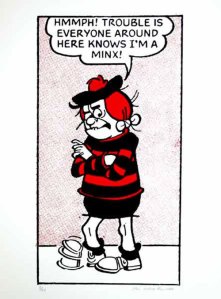
That got me thinking about other anarchic characters from my youth. Minnie the Minx. I loved her. She was my alter ego. What am I saying, there was no alter, she was my ego. She has a statue in Dundee, you know. I was an avid ‘70s Beano reader, a member of the Dennis the Menace and Gnasher fan club, had one of those badges with the wobbly eyes, but Minnie was where it was at.
In the late ’80’s Darlene, the younger daughter in Roseanne took up the banner for irreverent youth, saving those of us with no interest in Disney Princesses from a fate worse than death. And for those aspiring to more adult themes (alcoholism, sexual violence, bereavement, relationship trouble), hard-talking, gun-toting, gin-swilling Chris Cagney saw us right through the decade.
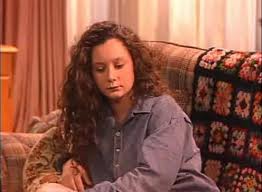
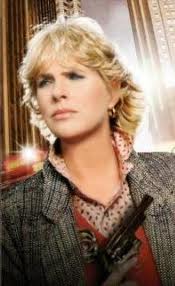
By the time I left home in the very last year of the 1980’s, TV as we had known it – a scheduled event, galvanising a family, a nation, a subculture – had only a few years left to live. There were now four channels, satellites were springing up like extra-terrestrial beings clinging to the sides of grey houses (everything was grey in the 80s). Video recorders were in vogue. Soon there would be a fifth channel. And then cable. And then internet TV.
So let’s raise a toast to simpler times and remember when a few tough talking female characters scattered first through our comics, and then across our cathode ray tube TVs, offered a bit of feisty escapism for those of us who’d never much wanted to be one of Charlie’s Angels.


